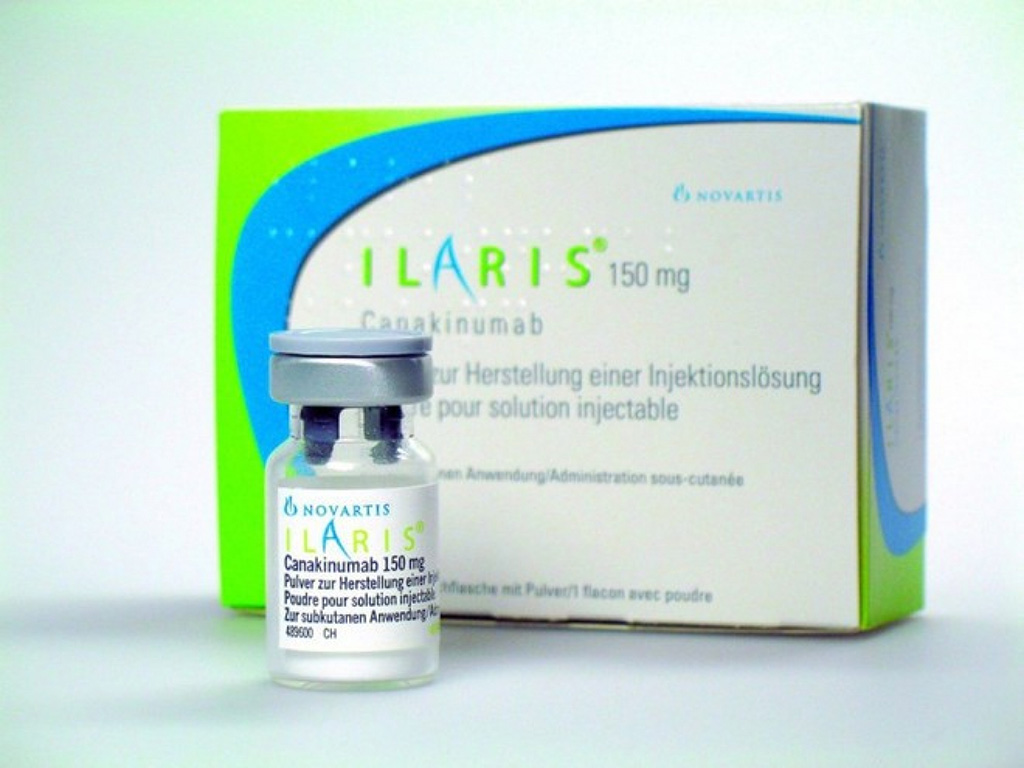Novartis To Begin Phase III Clinical Trial of Autoimmune Disease Drug in COVID-19 Patients with Pneumonia
|
By HospiMedica International staff writers Posted on 02 May 2020 |

Image: Ilaris 150 Mg Injection (Photo courtesy of Novartis).
Novartis (Basel, Switzerland) will initiate a Phase III clinical trial to examine the efficacy of utilizing canakinumab, an interleukin (IL)-1β blocker, to treat a type of severe immune overreaction called cytokine release syndrome (CRS) in people with COVID-19 pneumonia.
The study builds on early evidence from lab tests of COVID-19 patients who showed elevated IL-1β levels, among other cytokines. For the CAN-COVID trial, Novartis aims to rapidly enroll 450 patients at multiple medical centers across France, Germany, Italy, Spain, the UK and US and randomize them to receive either canakinumab or placebo on top of standard of care (SoC).
The primary objective of the study is to demonstrate the benefit of canakinumab in combination with SoC in increasing the chance of survival without the need for invasive mechanical ventilation among patients with COVID-19 pneumonia. Top-line results are anticipated late summer 2020.
Related Links:
Novartis

The study builds on early evidence from lab tests of COVID-19 patients who showed elevated IL-1β levels, among other cytokines. For the CAN-COVID trial, Novartis aims to rapidly enroll 450 patients at multiple medical centers across France, Germany, Italy, Spain, the UK and US and randomize them to receive either canakinumab or placebo on top of standard of care (SoC).
The primary objective of the study is to demonstrate the benefit of canakinumab in combination with SoC in increasing the chance of survival without the need for invasive mechanical ventilation among patients with COVID-19 pneumonia. Top-line results are anticipated late summer 2020.
Related Links:
Novartis

SARS‑CoV‑2/Flu A/Flu B/RSV Sample-To-Answer Test
SARS‑CoV‑2/Flu A/Flu B/RSV Cartridge (CE-IVD)
Latest COVID-19 News
- Low-Cost System Detects SARS-CoV-2 Virus in Hospital Air Using High-Tech Bubbles
- World's First Inhalable COVID-19 Vaccine Approved in China
- COVID-19 Vaccine Patch Fights SARS-CoV-2 Variants Better than Needles
- Blood Viscosity Testing Can Predict Risk of Death in Hospitalized COVID-19 Patients
- ‘Covid Computer’ Uses AI to Detect COVID-19 from Chest CT Scans
- MRI Lung-Imaging Technique Shows Cause of Long-COVID Symptoms
- Chest CT Scans of COVID-19 Patients Could Help Distinguish Between SARS-CoV-2 Variants
- Specialized MRI Detects Lung Abnormalities in Non-Hospitalized Long COVID Patients
- AI Algorithm Identifies Hospitalized Patients at Highest Risk of Dying From COVID-19
- Sweat Sensor Detects Key Biomarkers That Provide Early Warning of COVID-19 and Flu
- Study Assesses Impact of COVID-19 on Ventilation/Perfusion Scintigraphy
- CT Imaging Study Finds Vaccination Reduces Risk of COVID-19 Associated Pulmonary Embolism
- Third Day in Hospital a ‘Tipping Point’ in Severity of COVID-19 Pneumonia
- Longer Interval Between COVID-19 Vaccines Generates Up to Nine Times as Many Antibodies
- AI Model for Monitoring COVID-19 Predicts Mortality Within First 30 Days of Admission
- AI Predicts COVID Prognosis at Near-Expert Level Based Off CT Scans
Channels
Critical Care
view channel
Groundbreaking Technology Rapidly Detects Airborne Influenza Viruses
Influenza, caused by the influenza virus, poses a significant health risk, particularly in confined spaces. Now, a new, cutting-edge technology promises to enhance the early detection of airborne viruses... Read more
Flexible Semi-Autonomous Robot Could Deliver Medicine Inside Body
Soft robotics, in contrast to traditional rigid robots, are composed of flexible materials that mimic the movements of living organisms. This inherent flexibility makes them well-suited for navigating... Read moreSurgical Techniques
view channel
New Class of Bioadhesives to Connect Human Tissues to Long-Term Medical Implants
Medical devices and human tissues differ significantly in their composition. While medical devices are primarily constructed from hard materials like metal and plastic, human tissue is soft and moist.... Read more
New Transcatheter Valve Found Safe and Effective for Treating Aortic Regurgitation
Aortic regurgitation is a condition in which the aortic valve does not close properly, allowing blood to flow backward into the left ventricle. This results in decreased blood flow from the heart to the... Read more
Minimally Invasive Valve Repair Reduces Hospitalizations in Severe Tricuspid Regurgitation Patients
The tricuspid valve is one of the four heart valves, responsible for regulating blood flow from the right atrium (the heart's upper-right chamber) to the right ventricle (the lower-right chamber).... Read morePatient Care
view channel
Portable Biosensor Platform to Reduce Hospital-Acquired Infections
Approximately 4 million patients in the European Union acquire healthcare-associated infections (HAIs) or nosocomial infections each year, with around 37,000 deaths directly resulting from these infections,... Read moreFirst-Of-Its-Kind Portable Germicidal Light Technology Disinfects High-Touch Clinical Surfaces in Seconds
Reducing healthcare-acquired infections (HAIs) remains a pressing issue within global healthcare systems. In the United States alone, 1.7 million patients contract HAIs annually, leading to approximately... Read more
Surgical Capacity Optimization Solution Helps Hospitals Boost OR Utilization
An innovative solution has the capability to transform surgical capacity utilization by targeting the root cause of surgical block time inefficiencies. Fujitsu Limited’s (Tokyo, Japan) Surgical Capacity... Read more
Game-Changing Innovation in Surgical Instrument Sterilization Significantly Improves OR Throughput
A groundbreaking innovation enables hospitals to significantly improve instrument processing time and throughput in operating rooms (ORs) and sterile processing departments. Turbett Surgical, Inc.... Read moreHealth IT
view channel
Printable Molecule-Selective Nanoparticles Enable Mass Production of Wearable Biosensors
The future of medicine is likely to focus on the personalization of healthcare—understanding exactly what an individual requires and delivering the appropriate combination of nutrients, metabolites, and... Read more
Smartwatches Could Detect Congestive Heart Failure
Diagnosing congestive heart failure (CHF) typically requires expensive and time-consuming imaging techniques like echocardiography, also known as cardiac ultrasound. Previously, detecting CHF by analyzing... Read moreBusiness
view channel
Expanded Collaboration to Transform OR Technology Through AI and Automation
The expansion of an existing collaboration between three leading companies aims to develop artificial intelligence (AI)-driven solutions for smart operating rooms with sophisticated monitoring and automation.... Read more



















